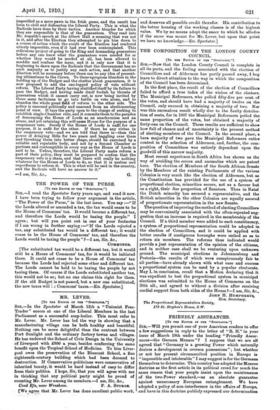THE COMPOSITION OF THE LONDON COUNTY COUNCIL.
[To THE EDITOR OF TRY " SPECIATOR."]
Sin,—Now that the London County Council is complete in all its parts, and the feeling associated with the election of Councillors and of Aldermen has partly passed away, I beg leave to direct attention to the way in which the composition of the Council has been determined.
In the first place, the result of the election of Councillors failed to afford a true index of the wishes of the electors. The Municipal Reformers, who polled fifty-five per cent. of the votes, and should have had a majority of twelve on the Council, only succeed in obtaining a majority of two. Nor was this anomalous result wholly due to the faulty distribu- tion of seats, for in 1907 the Municipal Reformers polled the same proportion of the votes, but obtained a majority of forty-one on the Council. These results are sufficient to show how full of chance and of uncertainty is the present method of electing members of the Council. In the second place, a bare majority of two gave the Municipal Reformers entire control in the selection of Aldermen, and, further, the com- position of Committees was entirely dependent upon the goodwill of this narrow majority.
Most recent experience in South Africa has shown us the way of avoiding the errors and anomalies which are patent here. The election of Members of the South African Senate by the Members of the existing Parliaments of the various Colonies is very much like the election of Aldermen, but as the Constitution has provided for the use of a system of proportional election, minorities secure, not as a favour but as a right, their due proportion of Senators. Thus in Natal the Dutch minority has secured a representative, and the British minorities in the other Colonies are equally assured of proportionate representation in the new Senate.
The question of improving the method of electing Councillors may be conveniently associated with the often-repeated sug- gestion that an increase is required in the membership of the Council If a third member were added to each constituency, a system of proportional representation could be adopted in the election of Councillors, and it could be applied with better results if contiguous boroughs were united so as to return six members. The reforms thus indicated would provide a just representation of the opinion of the citizens, and in neither case shall we be venturing upon unknown ground. The municipal elections in Johannesburg and Pretoria—the results of which were conspicuously fair to all parties—have already shown with what ease and success a proportional system can be used by a popular electorate. May I, in conclusion, recall that a Motion declaring that it was expedient to test the proportional system in municipal elections was submitted to the House of Commons on the 30th ult., and agreed to without a division after receiving cordial support from both sides of the House P—I am, Sir, &c., JOHN H. HUMPHREYS, Hon. Secretary.
The Proportional Representation Society,
179 St. Stephen's House, S.W.














































 Previous page
Previous page